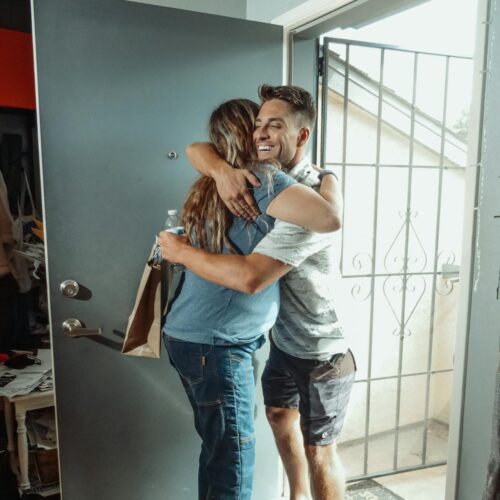Oriana House Works to Reconnect Formerly Incarcerated Parents with Their Children
For two hours one evening per week, Trisha, 27, gets the chance to make up for lost time with her three children.
Currently in the last month of her 3-month-stay at Oriana House—a residential reentry center in Summit County, Ohio, where Trisha was transferred from an Ohio prison to carry out the remainder of her sentence—Trisha is enrolled in the facility’s Partners in Parenting program, which works with residents to help them develop the skills necessary to become better parents upon release.
“It’s amazing—some stuff I didn’t know that I really needed to know, like how to discipline my kids right, praising them, and being a better parent than I was,” Trisha said. “There are other classes I take [at Oriana House] to help me deal with [issues] when I get home, but this one gives me the skills to be a good parent as well.”
Residential reentry centers (RRCs)–also known as halfway houses–such as Oriana House, serve as alternatives to traditional jails or prisons, where individuals are often relocated for a designated amount of time following their incarceration. These RRCs offer community-based rehabilitative support through substance use treatment, educational resources, employment and housing opportunities, and other services designed to reduce the likelihood that residents will reoffend and return to prison or jail.
In particular, the parenting skills and family reunification programs offered by RRCs can ameliorate dysfunctional family dynamics caused by absenteeism, and mitigate the pressures placed on both children and adults due to incarceration, according to a study in the Journal of Offender Rehabilitation assessing family programs for inmates.
Despite their perceived success, though, programs like Partners in Parenting are uncommon in RRCs across the country. In fact, according to the program’s director, Lisa House-Burns, Partners in Parenting is the first program of its kind in Ohio, where parents, like Trisha, get to visit with their children on a regular basis while living in the facility.
Rebuilding Relationships
A former public school teacher for 30 years, House-Burns developed the Partners in Parenting program to function much like a classroom.
The 9-week-long program is closed to anyone who is not specifically enrolled, and boasts a curriculum that covers parenting topics ranging from effective discipline techniques to how to properly care for a child. After the successful completion of the program, both the parents and their children are invited to take part in a graduation ceremony, complete with caps, gowns, diplomas, and a graduation party.
Through the Partners in Parenting program, parents are given time to engage with their children through such activities as playing board games, exploring the library, or creating arts and crafts projects together, a process which House-Burns said is emotional for herself as well as for the parents and children. House-Burns said she has seen children enter the program showing anger or resentment toward their parents, many times due to past trauma. But often when a child has been able to observe their parent going through a positive change, she said, the pair is more likely to reconnect and strengthen their relationship.
For parents in the program who have had their children while incarcerated, Partners in Parenting might be the first opportunity they’ve had to spend time with their children face-to-face. For House-Burns, this in-person interaction is vital to developing parenting skills and bridging the gaps that commonly cause problems for parents when they reenter their communities and rejoin their families.
Eye toward Expansion
Despite being the program’s only full-time staff member, House-Burns believes in the progress and momentum Partners in Parenting has gained since it launched a year ago. She said she’s already seen positive results from program graduates and the positive reactions from the community at large. Tarrena Grant, a graduate of the program, said through utilizing the tools she learned through Partners in Parenting, “A bond now exists between my children and I where there was never one.”
“The program plants the seeds for successful parenting and gives the clients a newfound purpose, along with a reason to stay clean and sober,” House-Burns said. “When clients leave Oriana House, those parenting seeds are ready to bloom into beautiful families.”
Recently, the Summit County Children’s Services department granted Partners in Parenting accreditation, making them an official provider of court-mandated parenting classes for people reentering the community from jail or prison. House-Burns is working to bring the program to another RRC in Oriana House’s network in 2016. After that, she hopes the program can be implemented in other RRCs statewide.
The federal Bureau of Prisons suggests that people who are transitioning maintain and facilitate close ties to their families, but they do not mandate that RRCs incorporate family intervention programs in their contracting requirements. But House-Burns sees them as instrumental in bettering the lives of the people returning to their communities from incarceration and their children, and hopes to see them become a more integral part of reentry services.
“It takes a community to raise a child, and the children are our future,” she said. “If we only made a difference for one person, that’s one more than if this program did not exist.”











